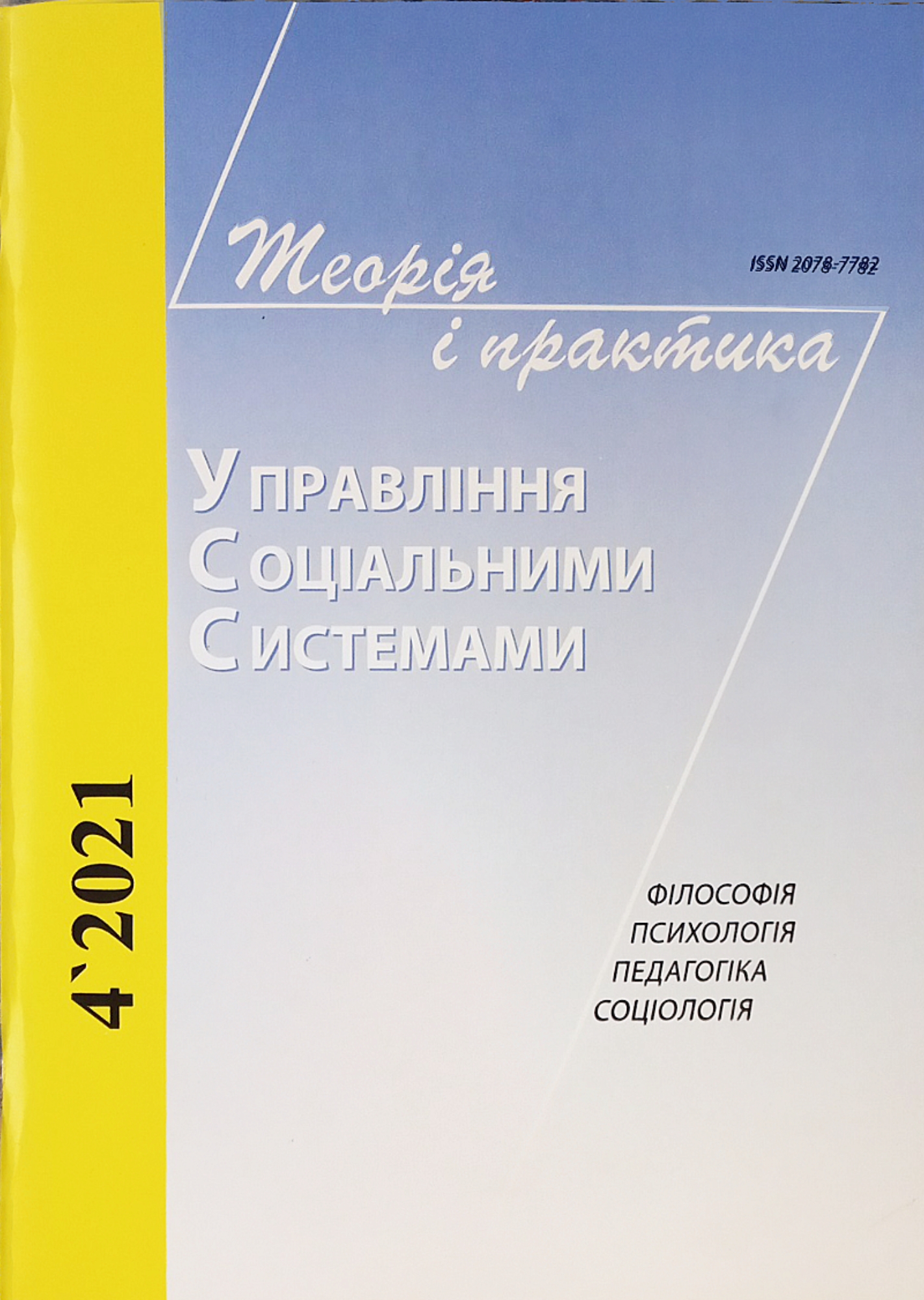ФЕНОМЕН ЛІДЕРСТВА У ЗАКЛАДАХ ВИЩОЇ ОСВІТИ: ТЕОРЕТИЧНИЙ АНАЛІЗ НАУКОВИХ ДОСЛІДЖЕНЬ
DOI:
https://doi.org/10.20998/2078-7782.2021.4.08Ключові слова:
лідерство, особистість, освітній процес, заклади вищої освіти, духовне лідерство, науково-практичне консультуванняАнотація
у статті вказується, що наукова проблема підготовки лідерів у закладах вищої освіти спрямована на розробку нових теоретико-методологічних та практичних засад, які відбивають основні закономірності формування лідерського потенціалу майбутнього фахівця. Вказано, що використання лідерського потенціалу та впровадження лідерства, яке суттєво покращить результативність вирішення складних ситуацій, спонукатиме до ефективної взаємодії всіх її учасників. Зосереджено увагу на те, що система освіти у процесі цільової підготовки лідерів повинна звертати увагу не тільки на формування необхідної сукупності знань та умінь, але й на розвиток у майбутніх лідерів здатності впливати на людей і надихати їх мріяти, навчатися і працювати більше. Наголошено на необхідність подальшого вивчення феномену духовного лідерства у сучасній науці для вдосконалення підготовки майбутніх фахівців закладів вищої освіти.
Посилання
1. Andreeva, G. M. (2017), “Social psychology”, textbook for higher education institutions, Moscow: Aspect Press, p. 363
2. Bendas, T. V. (2000), “Gender research of leadership”, Questions of psychology, no. 1, p. 87–95
3. Blanchard, K. (2008), “Leadership: to the top of success”, SPb.: Peter, p. 368
4. Blondel, J. (1992), “Political Leadership”, The Road to Comprehensive Analysis, M .: Ros. acad. upr., p.135
5. Vikhansky, O. S. (2003), “Mana-gement”, textbook, M .: Gardariki, p. 528
6. Gladskikh, E. (2012), “Leader with a human face: what is responsible leadership and why it is important for the company and society”, TOP-100. Rating of the best companies in Ukraine no. 1, pp. 16–18
7. Goloveshko, B. R. (2017), “Pedago-gical conditions of formation of leadership qualities in future specialists in administrative management in higher education”, dis… kand. ped. Sciences: 13.00.08 Theory and a technique of professional education, Vinnytsia, p. 294
8. Gren, L. M., Lola, N. M. (2019), “Formation of leadership qualities in junior specialists in the conditions of higher education institution of I-II level of accreditation”, Formation of the personality of a charismatic leader on the basis of humanitarian technologies: Materials of the III international scientific-practical conference September 26-27, 2019 / For the general. ed. Romanovsky, O. G., Kh .: NTU “KhPI”, p. 251, pp. 162–165
9. Dianin-Howard, A. K. (2008), “Moral Leadershi”, The path of personality formation, Moscow: Leaderprom, p. 187
10. Jay Ross, Templar Richard (2010), “Algorithms of efficient work”, Encyclopedia of Manager. prov. from english M. Alpina Bee demolished Bux, p. 676
11. Krysko, V. (2003), “Dictionary-reference book on social psychology” / St. Petersburg: Peter, p. 416
12. McRae Bill (1997), “Spiritual Leadership [Text]: how to lead by God’s way; ed. Solominskaya, G., [b. m.]: Maranafa, p. 86
13. Manfred Cats de Vries (2011), “Mysticism of Leadership”, Development of Emotional Intelligence The Leadership Mystique: A User’s Manual for the Human Enterprise, M. : “Alpina Publisher”, p. 276
14. Nestulya, O. O., Nestulya, S. I. (2016), “Fundamentals of leadership”, Scientific concepts (middle of the XX - beginning of the XXI century.: textbook, Poltava: PUET, p. 375
15. Osipov, G. V. (1995), “Encyclopedic sociological dictionary”, M .: ISPI RAN, p. 940
16. Pidbutska, N. V., Knysh, A. E., Bogdan, J. B., Chebakova, Yu. G. (2021), “Communicative properties of students-psychologists, inclined to leadership”, Problems of modern psychology, no. 3, p. 48–57
17. Pintosevich, I. (2013), “Influence! 7 commandments of the leader”, M .: Exmo, p. 288, available at: http://i.booksgid.com/web/online/43127
18. Radina, N. K. (2002), “Sociocultural aspects of leadership”, textbook for the course “Individual and political leadership”, Nizhniy Novgorod, p. 100
19. Romanovsky, O. G., Ponomarev,O. S. (2021), “Can everyone be a leader?”, Theory and practice of social systems management, no. 3, p. 4–16
20. Romanovsky, O. G., Reznik, S. .M, Gura, T. V., Panfilov, Y. I., Goloveshko, B. R., Bondarenko. V. V (2017), “Leadersky qualities in professional activity”, for general. ed. OG Romanovsky, Kharkiv: NTU “KhPI”, p. 143
21. Romanovsky, O. G., Sereda, N. V. (2013), “The personality and practice of management of social systems, no. 3, p. 20–27
22. Filatova, L. S., Novokhatskaya, L. V. (2014), “Theoretical aspects of leadership theories through the prism of effective leadership”, Economics: the realities of time, no. 3 (13), pp. 64–69
23. Filonovich, S. R. (1999), “Leadership and practical skills of the manager”, 17-modular program for managers “Management of organizational development”, Module 9, M.: “INFRA-M”, p. 328
24. Cherkashin, A. I. (2019), “Metho-dological approaches to the education of the personality of future specialists-leaders in institutions of higher education of Ukraine”, Theory and practice of management of social systems, no. 2, pp. 60–72
25. Cherkashin, A. I. (2019), “Conceptual provisions of methodological measurement in the context of education of leaders in higher education institutions”, Theory and practice of social systems management, Quarterly scientific-practical journal, Kharkiv: NTU “KhPI”, no. 1, pp. 102–115
26. Bass, B., Bass, R. (2009), “The Bass handbook of leadership: theory, research, and managerial applications”, N.Y.: Simon and Schuster, p.1465
27. Kotter, J. (1996), “Leading Change”, Boston: Harvard Busi – ness School Press, p. 208
28. Krasikova, D. V., Green, S. G., LeBreton, J. M. (2013), “Destructive leadership a theoretical review, integration, and future research agenda”, Journal of Management. – no. 39(5), pp. 1308-1338
29. Lipman-Blumen, J. (2005), “Toxic leadership: when grand illusions mas-querade as noble visions”, Leader to Leader, no. 2005.36, p. 29

##submission.downloads##
Опубліковано
Номер
Розділ
Ліцензія
Авторське право (c) 2021 Андрій Черкашин

Ця робота ліцензується відповідно до Creative Commons Attribution-NonCommercial-NoDerivatives 4.0 International License.
Автори, які публікуються у цьому журналі, погоджуються з наступними умовами:- Автори залишають за собою право на авторство своєї роботи та передають журналу право першої публікації цієї роботи на умовах ліцензії Creative Commons Attribution License, котра дозволяє іншим особам вільно розповсюджувати опубліковану роботу з обов'язковим посиланням на авторів оригінальної роботи та першу публікацію роботи у цьому журналі.Автори, які публікуються у цьому журналі, погоджуються з наступними умовами:
